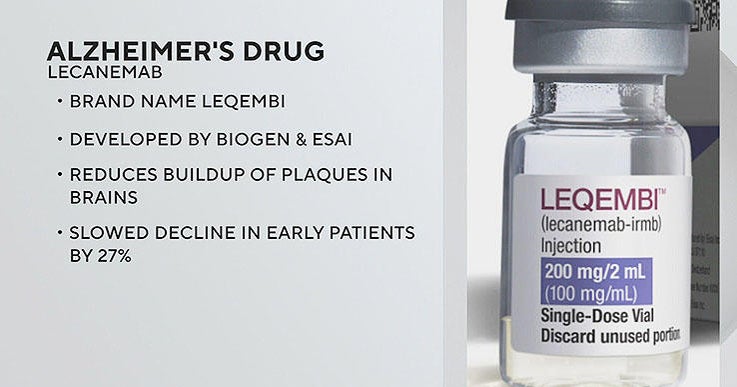
FDA Accepts Filing of Leqembi (Lecanemab-irmb) sBLA for Alzheimer’s Disease Treatment
Introduction
In a recent announcement, Eisai revealed that the U.S. Food and Drug Administration (FDA) has accepted its Supplemental Biologics License Application (sBLA) for less frequent monthly lecanemab-irmb (Leqembi) intravenous (IV) maintenance dosing for the treatment of Alzheimer’s disease (AD) in patients with mild cognitive impairment or mild dementia stage of disease (collectively referred to as early AD). The Prescription Drug User Fee Act (PDUFA) action date is set for January 25, 2025. Leqembi is designed to sustain the clearance of highly toxic amyloid beta (Aβ) protofibrils that can continue to cause neuronal injury.
What is Leqembi?
Leqembi (lecanemab-irmb) is a humanized immunoglobulin gamma 1 (IgG1) monoclonal antibody directed against aggregated soluble (protofibril) and insoluble forms of amyloid-beta (Aβ). It is the result of a strategic research alliance between BioArctic AB and Eisai, and is approved in the U. S., Japan, China, and South Korea.
Mode of Action
Protofibrils are believed to contribute to the brain injury that occurs with AD and are considered to be the most toxic form of Aβ, having a primary role in the cognitive decline associated with this progressive, debilitating condition. Protofibrils cause injury to neurons in the brain, which in turn, can negatively impact cognitive function via multiple mechanisms, not only increasing the development of insoluble Aβ plaques but also increasing direct damage to brain cell membranes and the connections that transmit signals between nerve cells or nerve cells and other cells. By reducing protofibrils, Leqembi may prevent the progression of AD and reduce damage to neurons in the brain, hence reducing cognitive dysfunction.
Clinical Trials Overview
The sBLA for less frequent monthly lecanemab-irmb (Leqembi) intravenous (IV) maintenance dosing for the treatment of Alzheimer’s disease (AD) in patients with mild cognitive impairment or mild dementia stage of disease (collectively referred to as early AD) is based on observations from phase 2 (Study 201) and the open-label extension (OLE) studies. Data from studies 201, 301, and their OLEs show that continued treatment with Leqembi beyond the 18-month core phase prolongs the benefit as highly toxic protofibrils are continuously reduced. In the Clarity AD study, lecanemab met its primary endpoint and all key secondary endpoints with statistically significant results. The results of the Clarity AD study were presented in the New England Journal of Medicine, a peer-reviewed medical journal. Since July 2020, Eisai’s Phase 3 clinical study (AHEAD 3-45) for individuals with preclinical AD, meaning they are clinically normal and have intermediate or elevated levels of amyloid in their brains, is ongoing. Since January 2022, the Tau NexGen clinical study for Dominantly Inherited AD (DIAD), which is conducted by Dominantly Inherited Alzheimer Network Trials Unit (DIAN-TU), led by Washington University School of Medicine in St. Louis, is ongoing and includes Leqembi as the backbone anti-amyloid therapy.
Global Availability
Leqembi is approved in the U. S., Japan, China, and South Korea, and applications have been submitted for review in several countries including the European Union, Australia, Brazil, Canada, Hong Kong, Great Britain, India, Israel, Russia, Saudi Arabia, Taiwan, Singapore, and Switzerland. Eisai is responsible for the clinical development, applications for market approval, and commercialization of Lecanemab for Alzheimer’s disease. BioArctic has no development costs for Lecanemab in Alzheimer’s disease and is entitled to payments in connection with certain regulatory approvals, and sales milestones as well as royalties on global sales. In addition, BioArctic has the right to commercialize Lecanemab in the Nordic region, pending European approval, and currently, Eisai and BioArctic are preparing for a joint commercialization in the region.
Conclusion
Leqembi represents a significant advancement in the treatment of Alzheimer’s disease, and the acceptance of its sBLA filing is a critical milestone in its development pathway. If approved, the clinical and biomarker benefits of this drug may be maintained through the once-monthly dosing regimen that is less burdensome and easier for patients and caregivers to continue long-term. This announcement provides hope for the millions of people living with Alzheimer’s disease and their caregivers.

